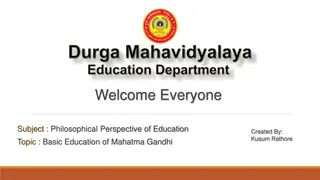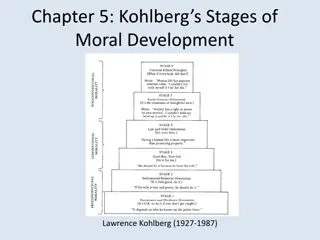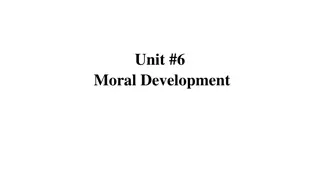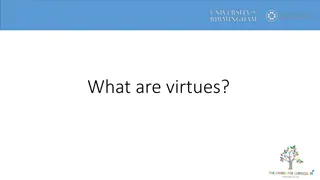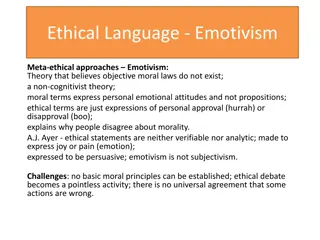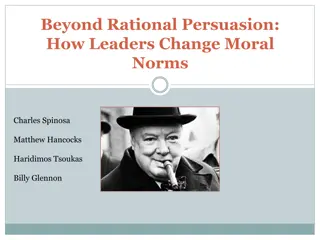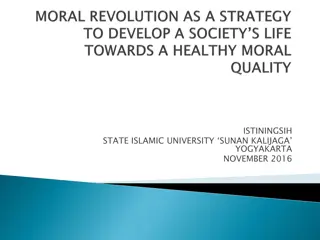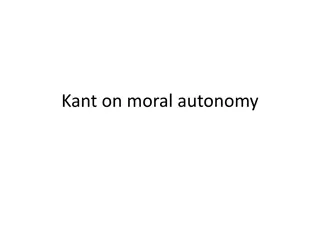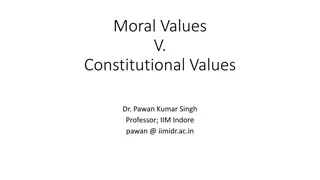
Factors Influencing Moral Development in Children and Adolescents
Explore the various factors influencing moral development in children and adolescents, including the role of family, child-rearing practices, schools, neighborhoods, and religious institutions. Discover how these elements shape ethical virtues and conscience development to set the foundation for moral decision-making. Gain insights into the significant impact each factor has on the upbringing and socialization of young individuals.
Download Presentation

Please find below an Image/Link to download the presentation.
The content on the website is provided AS IS for your information and personal use only. It may not be sold, licensed, or shared on other websites without obtaining consent from the author. If you encounter any issues during the download, it is possible that the publisher has removed the file from their server.
You are allowed to download the files provided on this website for personal or commercial use, subject to the condition that they are used lawfully. All files are the property of their respective owners.
The content on the website is provided AS IS for your information and personal use only. It may not be sold, licensed, or shared on other websites without obtaining consent from the author.
E N D
Presentation Transcript
Moral Development part-2 PGDCP; SEMESTER-II COURSE: Life Span Paper VI; Unit IV By Dr. Priyamvada Part Time/Guest Faculty Institute of Psychological Research and Service Patna University Email-priyamvadapreet@gmail.com Contact-9693299059
FACTORS INFLUENCING MORAL DEVELOPMENT 1. Family: Family plays an active role in the moral development of children. Ethical and moral virtues like co-operation, obedience, discipline, truthfulness, sincerity, self-submission, sympathy, love, honesty, sublimation of instincts, subordination of self, to the larger interest of the society, realizing and discharging responsibility are developed in the family. Congenial environment in the family is conducive to moral development. Family members having immoral background adversely influence moral development of the child. Studies show that lower class parents tend to place greater emphasis on conformity to external authority. The middle class parents emphasize internal regulation of behavior. It may be due to the fact that the lower class boys behave more aggressively and experience less guilt in the process than the middle class boys.
CHILD REARING FACTORS: The child rearing practices also effect the conscience development. The love-oriented practices in child rearing are more effective in conscience development. In the families in which the child is given praise and warmth and life of reason is emphasized the conscience development takes place in an effective manner.
2. SCHOOL School is said to be the fountain head of social and moral virtues. It plays an important role in moral development of students. Teacher s personality i.e., his social and moral attitudes, habits, interests, values and beliefs, discipline in the school maintained through love, affection, sympathy, personal example of teacher exercises positive influence in moral development of students. Co-curricular activities like mass prayer and morning assembly, social service activities, self-government, celebration of birth days of great men provide ample opportunities for the inculcation of moral qualities like honesty, obedience, truth, justice, fellow-feeling, love and respect for others. Thus the students get training in the habits and graces of moral life.
3. NEIGHBOURHOOD Interests, habits, sentiments and character of neighbours exert significant influence in moral development of children. Presence of the houses of drunkards, dacoits, gamblers and prostitutes negatively influences moral development.
4. RELIGIOUS INSTITUTIONS Religious institutions like temples, Gurudwaras, Church have been regarded as primary social and moral institutions. Religion is of dominant influence in determining social and moral attitudes and moral functioning. Thus ethnic or religious institutions significantly influence moral development of individuals.
5. CLUB AND CAMP EXPERIENCES Club and camp experiences prove useful in the development of valuable social and moral qualities like obedience, cheerfulness, politeness, kindness, co-operation, honesty, and loyalty.
6. PLAYMATES AND FRIENDS Playmates and friends have vital influence in the moral development of the child. His moral attitudes, beliefs, interests, sentiments, habit and character are influenced by playmates and companions.
7. CULTURE The existing cultural environment exerts a powerful influence in the moral development. Customs, traditions, mores folkways and values of the groups i.e., home, school as well as society significantly influence moral development. Social traditions, customs, values and norms are unwritten laws that the child has to follow.
8. COMMUNITY community in which the individual moves is a potent factor in moral development. The community influences on the child are Musemus, Cinema, libraries, programmes on radio and television, other recreational programmes and community environment at large.
ROLE OF TEACHER IN MORAL DEVELOPMENT EDUCATIONAL IMPLICATIONS OF MORAL DEVELOPMENT 1 Personal example of teachers 2. Presenting moral ideals 3. Example of great heroes 4. Biographies of great-men 5. Celebration of days 6. Other co-curricular activities
References Shaffer. David. R., and Kipp. Katherine., Developmental Psychology, Childhood and adolescence, 8th edition, Wadsworth cengage learning. Google images and Google search Thank you


